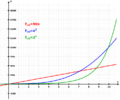Template:Selected anniversaries/December 5: Difference between revisions
Jump to navigation
Jump to search
No edit summary |
No edit summary |
||
| Line 1: | Line 1: | ||
<gallery mode="traditional"> | <gallery mode="traditional"> | ||
File:Mary Celeste map.jpg|link=Mary Celeste (nonfiction)|1872: The crewless American ship ''[[Mary Celeste (nonfiction)|Mary Celeste]]'' is found by the Canadian brig ''Dei Gratia''. The ship had been abandoned for nine days but was only slightly damaged. | File:Mary Celeste map.jpg|link=Mary Celeste (nonfiction)|1872: The crewless American ship ''[[Mary Celeste (nonfiction)|Mary Celeste]]'' is found by the Canadian brig ''Dei Gratia''. The ship had been abandoned for nine days but was only slightly damaged. | ||
File:Exponential-growth-diagram.svg|link=Crimes against mathematical constants|1871: new class of [[crimes against mathematical constants]] exploits uncertainty about the fate of ''[[Mary Celeste (nonfiction)|Mary Celeste]]''. | |||
File:Sir Tony Hoare 2011.jpg|link=Tony Hoare (nonfiction)|1960: [[Tony Hoare (nonfiction)|Tony Hoare]] invents quicksort routine which reduces the effects of [[crimes against mathematical constants]]. | |||
</gallery> | </gallery> | ||
Revision as of 17:28, 29 November 2016
1872: The crewless American ship Mary Celeste is found by the Canadian brig Dei Gratia. The ship had been abandoned for nine days but was only slightly damaged.
1871: new class of crimes against mathematical constants exploits uncertainty about the fate of Mary Celeste.
1960: Tony Hoare invents quicksort routine which reduces the effects of crimes against mathematical constants.


